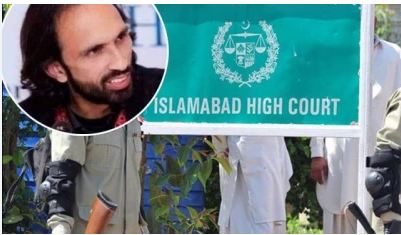Court Reporter
ISLAMABAD, MAY 24 /DNA/ – Islamabad High Court (IHC) senior puisne judge Justice Mohsin Akhtar Kayani on Friday summoned officials from the country’s intelligence agencies and the defence and interior ministries in a case about the recovery of missing Kashmiri poet Ahmed Farhad Shah.
The judge summoned the sector commanders of the Inter Services Intelligence (ISI) and Military Intelligence (MI), the director of the Intelligence Bureau (IB), Law Minister Azam Nazeer Tarar and the defence and interior secretaries in the next hearing on May 29.
The development came as Justice Kayani resumed hearing a petition seeking the recovery of the poet.
The Human Rights Commission of Pakistan had called for the immediate release of Shah, who had been allegedly abducted from his home on May 15.
A petition had been filed by Shah’s wife in the IHC the same day, requesting that he be found and produced before the court and to identify, investigate and prosecute those responsible for his disappearance.
On May 16, Justice Kayani had summoned a report from the defence secretary on the alleged role of intelligence agencies in the poet’s disappearance.
Earlier this week, the judge, expressing dissatisfaction with the “working” of the defence secretary, had called on intelligence agencies to shed the label of culpability in abductions.
Upon seeking an explanation from the defence secretary by 3pm the same day, the court had been informed that Shah was not in the custody of the Inter-Services Intelligence (ISI). Justice Kayani then summoned the defence and interior secretaries in person the next day.
However, on Tuesday, Attorney General of Pakistan (AGP) Mansoor Usman Awan had submitted the defence secretary’s report, stating that the official was sick. The judge again said that the secretary should appear before the court in the next hearing.
Justice Kayani then ordered the AGP to recover the missing poet within four days, which he took “full responsibility” of. Upon being asked about the ISI sector commander’s statement, Senior Superintendent of Police (SSP) Jameel Zafar told the court he could not do so due to the former’s absence.
During today’s hearing, AGP Awan and Islamabad Inspector General (IG) Ali Nasir Rizvi appeared before the court.
The court order, written in Urdu and available with Dawn.com, said: “The AGP was asked [whether] the law enforcement institutions, including ISI and MI, were performing their duties under any law to which the AGP said that the ISI is directly accountable to the prime minister of Pakistan while the MI is associated with the defence secretary and the armed forces of Pakistan.
“Looking at the explanation of this matter, the court considers it necessary that all the institutions should work within their constitutional limits, but in the present situation, we cannot do a comparative assessment of the administrative performance of the ISI with the police, FIA (Federal Investigation Agency) and CTD (Counter-Terrorism Department) until the court is briefed about official practices in institutions such as the ISI and MI, including the way to conduct investigation and inquiry.”
The order said the defence secretary was thus summoned in his personal capacity so he could submit a written explanation to the court on the above matters.
“This would allow the court to clarify the role of the agencies in the jurisdiction of police investigation in the future and lead them to be accountable in the jurisdiction of the court,” the order said.
At the outset of the hearing, AGP informed the court that a few call detail records (CDRs) were available that were being used to trace Shah.
At this, Justice Kayani asked him, “Are you saying that the state has failed?”
To the AGP’s reply in negative, the judge observed, “To recover [the missing person] is the state’s compulsion, otherwise it would be its failure.”
Justice Kayani then asked if the defence secretary was present, to which Awan said he was not as the court order had not mentioned so. “However, he will appear [if summoned],” the AGP assured the judge.
Justice Kayani then ordered: “The defence secretary should appear at the next hearing and explain to us the ISI’s workings.
“How many sector commanders and their sub-ordinates are in the ISI?” he asked, adding that intelligence agencies would no more remain “in hiding”.
The judge reiterated that not recovering Shah was the state’s failure, at which AGP Awan requested the court to not term it a failure: “If we are not able to present him [before the court], I’ll admit that the state has failed.”
At this point during the hearing, Justice Kayani, referring to the police officials present in the court, said they had appeared there as they were “answerable”.
“Transparency in the working is highly important,” the judge observed, noting that while performing their duties, policemen “get beaten and have their uniforms torn apart too”.
“If neither institutions are answerable nor can you make them answerable, what would happen? There must be a structure for agencies [where] someone is answerable to someone,” Justice Kayani noted.
The judge then remarked that at this point, Shah’s recovery was inconsequential compared to “a few things” that he said he would settle.












